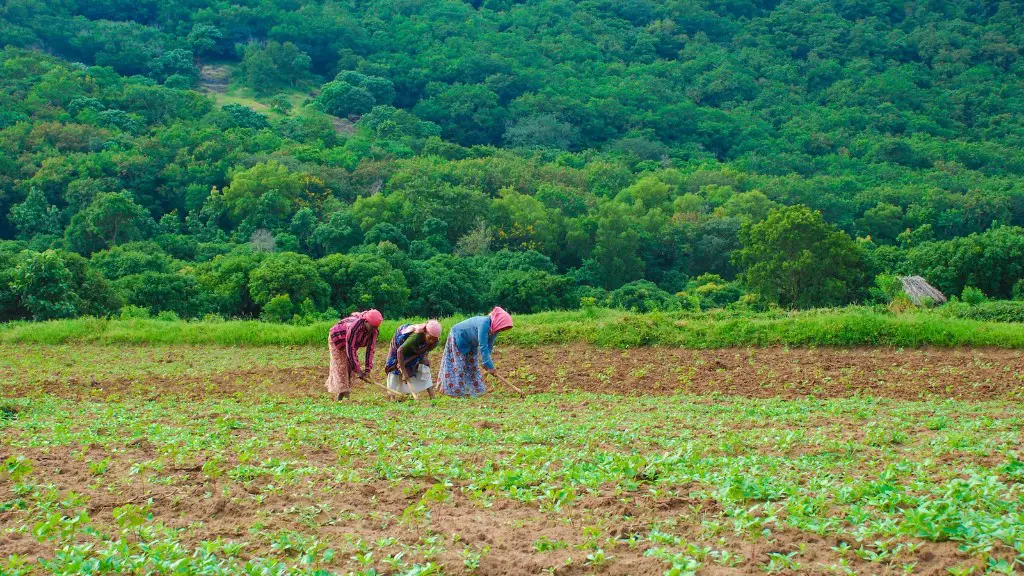Agriculture is a means of providing livelihood to people, producing food and other crops, and maintaining the ecology on which all other life forms depend. It involves the use of land, labour, capital, and technology to produce and manage crops, livestock, and other food products. It can be divided into arable and horticultural, pastoral, and forest-based forms. Arable is the cultivation of the land for the production of food and other crops, whilst horticultural is the cultivation of plants for ornamental, forage, and food purposes. Pastoral agriculture is the production of livestock, mainly for milk, meat and wool. Forest-based agriculture includes timber production, wild-harvesting, and non-wood forest production. All of these forms of agriculture are essential to food security and sustainable development.
Agricultural Techniques
The techniques employed in agriculture depend on the environment and the type of crops and livestock being produced. Common techniques include crop rotation, fertilization, and irrigation, and animal husbandry. Crop rotation is the practice of growing different crops in the same field for different years to help reduce the build-up of pest populations and the levels of weed growth, and to help reduce the risk of soil erosion. Fertilization and irrigation are essential for adequate crop production. Fertilization can involve the use of organic or inorganic methods and irrigation can involve surface or subsurface water sources. Animal husbandry involves the breeding and care of livestock, as well as the selection of genetic traits that make animals more valuable for food production.
Agricultural Trade
Agriculture is an integral component of international trade. Goods produced in agriculture are traded both domestically and internationally. Trade liberalization, which is the process of reducing barriers to trade, has significantly increased the flow of agricultural products, thus increasing the economic and political significance of agriculture. These trade flows also provide important resources for food security in developing countries. The global value of agricultural exports and imports is estimated to represent over 10% of the world’s gross domestic product.
Agricultural Policies
Trusts and groups of national governments collaborate to implement policies and regulations concerning agriculture in order to ensure the efficient operation of the sector. Some of these policies include subsidies to vulnerable farmers, tariffs and other norms to protect domestic agricultural products, trade agreements to boost exports and imports, and resource management policies to protect natural resources. Certain policies may also be used to protect agricultural producers and small-scale farmers. These policies aim to foster sustainable agricultural production, improve food security, and reduce poverty.
Agricultural Research
Research is an important component of agriculture. Research focuses on understanding the ecology of agricultural systems and on developing the Appropriate Technologies that can assist farmers in their production. This research helps to produce more productive and resilient crops, improve drought and pest resistance, and better understand the impact of climate change on agricultural systems. Research also looks into social and economic aspects of agriculture, such as poverty, food security, and rural development.
Innovations in Agriculture
There have been a number of important innovations in agriculture that have helped to improve productivity, reduce environmental impact, and increase efficiency. These innovations include the use of chemical inputs such as pesticides, biotechnologies such as genetically-modified organisms, mechanization, irrigation technologies, tools for precision farming, and information technologies such as remote sensing. Each of these advances has helped to reduce poverty, increase food security, and foster sustainable agricultural production.
Agricultural Education
Education is also an important part of agricultural development. Educating farmers and other stakeholders about topics such as climate change, sustainable farming practices, seed varieties, and market opportunities helps to ensure that they are prepared to face the challenges of the future. Educating the general public about food production and availability is also essential for the future of agriculture, as we must ensure the public understands the importance of agriculture in order to ensure its future sustainability.

